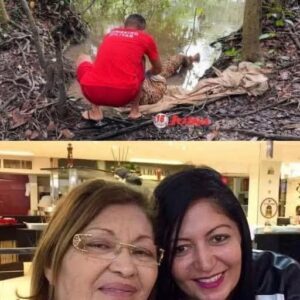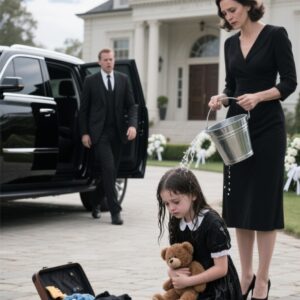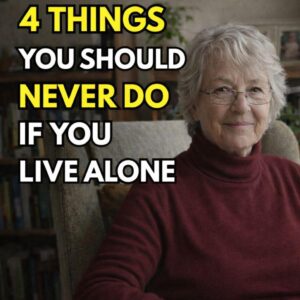My 14-year-old son has become ashamed of my husband and me. He treats us like garbage. Well, I’ve had enough.
So while driving, I said, “Duck!” and pushed his head down. I then told him, “That’s what I feel like doing every time you act like you don’t know me in public.”
He sat up with wide eyes, confused and a little shaken. I wasn’t trying to scare him, just shake him out of that smug little bubble he’d built around himself lately.
Things hadn’t always been like this. When he was younger, he used to run into my arms at school pickup. He once made a macaroni necklace for me in second grade and insisted I wear it to the grocery store. But somewhere around middle school, that child vanished.
Now he barely looked up from his phone, only spoke in grunts, and walked ten feet ahead of us in public like he was embarrassed to be seen with “old people.” I could handle the silence, but the eye rolls, sarcastic jabs, and cold stares? That stung.
It all came to a head at the school fundraiser last Friday. We had volunteered to help out, just like we always did. My husband, Alan, was working the grill, and I was managing the raffle table. We’d spent our Friday evening—after working full-time jobs—just to be there for him.
He walked past us with two of his friends, didn’t even glance our way. When one of them asked, “Aren’t those your parents?” he shrugged and said, “I don’t want people to think we came together.”
I heard him. I felt it. That sentence echoed in my chest like a slap. Alan pretended not to hear, but I saw his hands tighten around the spatula.
That’s when I made up my mind.
Saturday morning, I told Alan we were going to take a drive—just the three of us. “Oh, what now?” our son groaned. “Is this going to be some kind of lame bonding thing?”
“In a way,” I said, tossing him a granola bar. “Get in.”
We drove an hour out of town, to a roadside diner we used to stop at when he was little. On the way, he barely spoke. Headphones in, staring out the window, acting like we were doing him the biggest disservice by simply existing.
Then came that moment. I said, “Duck!” and pushed his head down as we approached a flock of geese crossing the road. He flinched, ducked automatically, then looked at me like I was insane.
“Why did you do that?!”
“That’s what I feel like doing every time you act like you don’t know us in public.”
Silence. For once, no sarcastic reply.
We pulled into the diner parking lot and I turned off the engine. “Out,” I said. “We’re going in.”
He dragged his feet behind us, but followed. We sat in the same corner booth we used to eat pancakes in, back when he thought the whipped cream mountain on his plate was magic.
The waitress—same one from years ago—recognized us. “Well look who it is! Haven’t seen you folks in forever. And look at you, mister! You’ve shot up like a beanstalk.”
He gave a small smile. “Yeah. I guess.”
We ordered our usual. He stared at his phone the whole time.
When the food arrived, I leaned forward and said, “You’re ashamed of us, aren’t you?”
He shrugged. “You guys are just… old. And cringey.”
Alan didn’t flinch, just sipped his coffee. “You didn’t seem to mind when we stayed up three nights straight helping you build that science fair volcano.”
“Or when we worked double shifts to afford that gaming laptop you ‘absolutely needed,’” I added.
“That’s different,” he muttered.
“How?” I asked. “How is it different?”
“I don’t know!” he snapped. “Kids at school… they judge you for everything. What your parents wear, what they say. I don’t want to be laughed at.”
“And you think they’d laugh at you because we exist?”
He looked away. “I’m sorry, okay?”
“Not okay,” I said. “We’ve always shown up for you. Now it’s your turn to understand what that means.”
He didn’t reply, but he didn’t look at his phone again for the rest of the meal.
On the way back, we took the long route through town. I made a detour and pulled into the community shelter we occasionally volunteered at during the holidays.
“What are we doing here?” he asked.
“Come on,” I said. “Time to meet someone.”
Inside, I introduced him to Greg, a 19-year-old who aged out of the foster system. He lived in his car and came in for meals. I’d helped him write a resume last December.
“Your mom’s a real one,” Greg said, clapping my son on the shoulder. “I didn’t even know how to tie a tie until she taught me.”
He blinked. “You did that?”
“She’s done a lot more,” Greg said. “You’re lucky, kid. I’d have given anything to have parents who cared enough to show up, even if they wore socks with sandals.”
My son smiled, sheepish. “Yeah. I guess I’ve been kind of a jerk lately.”
Greg laughed. “That’s called being 14. But don’t push too hard—you don’t wanna wake up at 19 with nobody in your corner.”
On the drive home, something shifted. My son didn’t just stare out the window. He asked questions about Greg. Wanted to know if he’d gotten a job yet.
That night, he sat at the dinner table instead of taking his plate upstairs.
The next week, he invited Alan and me to the school play. “I’m not in it,” he said. “But I thought you might want to come. I’m working the lights.”
We went. He didn’t walk ten feet ahead of us that night. Didn’t introduce us as “just the people I live with.” He said, “These are my parents.”
Small steps. But real ones.
Still, kids slip back sometimes. The following month, we were at the mall when he spotted a group of his classmates. He tried to pretend he didn’t see us and veered off.
I didn’t say anything. I just pulled out my phone, snapped a picture of him ducking behind a mannequin, and texted it to him with the caption: “Guess who’s hiding now?”
A minute later, he returned and said, “Okay, fine. That was lame of me.”
“You think?” I said, laughing.
He put his arm around my shoulders. “I’m still figuring this stuff out. But you’re right. I was acting like a brat.”
We walked out of that mall side by side. Alan gave me a look, that soft smile that said we did alright.
Months passed. He started coming around more. He still got embarrassed sometimes—that’s just part of being a teen—but he no longer treated us like lepers.
One evening, we were at a neighborhood BBQ and one of the other kids teased him, saying, “Your mom’s so extra, bro.”
I waited for his usual eye-roll or sarcastic quip. But he just said, “Yeah, she is. She’s awesome.”
My heart could’ve burst.
Later that night, he came up to me and said, “I didn’t mean it before. What I said at the fundraiser. I was just trying to look cool. I knew it was wrong even as I said it.”
“I know,” I said, pulling him into a hug. “But words matter. And so do actions.”
He nodded. “I’m learning that.”
That summer, he joined us at the shelter twice a week. He helped clean, serve food, even played chess with some of the older men there. One of them called him “the good one.”
By the end of the year, he wrote an essay in English class titled ‘The People I Used To Take For Granted.’ His teacher sent it to me, saying it made her cry.
He had written:
“I used to be embarrassed by my parents. I thought they were uncool. But now I know—they’re the ones who show up. They love me even when I’m being a jerk. They’ve taught me more than school ever could.”
I framed that page and hung it in the hallway.
Not because I needed validation, but because it reminded me that growth takes time. Especially in kids.
Sometimes, a wake-up call looks like a road trip and a diner pancake. Sometimes it looks like volunteering next to people who’ve never had what you take for granted.
The lesson? Don’t give up on your kids, even when they push you away. They’re still watching. Still learning. And sometimes, the most powerful way to teach them is by simply refusing to disappear.
If you’ve ever been dismissed by your own child or felt unappreciated for all you do—just know, they do notice eventually. Keep showing up. Your presence will speak louder than any lecture.
And if you liked this story or could relate even a little—share it. Maybe it’ll remind someone else that even the toughest teenagers still need their parents more than they let on.






